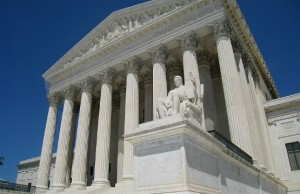 We often think of the Supreme Court as the arbiter of distinctly national disputes – for example, whether the Affordable Care Act can require all of us to obtain health insurance or pay a penalty, or whether public universities can consider race as one factor in their admissions process. But yesterday the Court waded into a dispute that is playing out on a global stage: whether a U.S. citizen born in Jerusalem can choose to have his place of birth listed as “Israel” on his passport. The answer, according to the U.S. government, could have a potentially explosive impact on the U.S.’s role in the Middle East peace process, and possibly even on the peace process itself. Let’s talk about Zivotofsky v. Kerry and yesterday’s argument in Plain English.
We often think of the Supreme Court as the arbiter of distinctly national disputes – for example, whether the Affordable Care Act can require all of us to obtain health insurance or pay a penalty, or whether public universities can consider race as one factor in their admissions process. But yesterday the Court waded into a dispute that is playing out on a global stage: whether a U.S. citizen born in Jerusalem can choose to have his place of birth listed as “Israel” on his passport. The answer, according to the U.S. government, could have a potentially explosive impact on the U.S.’s role in the Middle East peace process, and possibly even on the peace process itself. Let’s talk about Zivotofsky v. Kerry and yesterday’s argument in Plain English.
Since 1948, the United States has declined to recognize any country as having sovereignty over the holy city of Jerusalem. But in 2002, Congress passed a law that instructed the Secretary of State, upon request, to list the birthplace of a U.S. citizen born in Jerusalem as “Israel” on his passport. President George W. Bush signed the law, but at the same time he issued a statement – known as a “signing statement” – in which he protested that the law “interferes with the President’s constitutional authority to conduct the Nation’s foreign affairs and to supervise the . . . executive branch.”
The child at the heart of today’s case, Menachem Zivotofsky, was born in Jerusalem in 2002 to U.S.-citizen parents. When his parents applied for a passport for him, they asked – consistent with the then-new law — to have his place of birth be designated as “Israel” on his passport. When the State Department refused, the family brought this lawsuit, which has already been to the Supreme Court once before. Two years ago, the Justices decided that the lawsuit could continue; it was not, they concluded, the kind of “political question” that courts should leave to the president and Congress.
Read the full story at SCOTUSblog.
The words of this author reflect his/her own opinions and do not necessarily represent the official position of the Orthodox Union.


